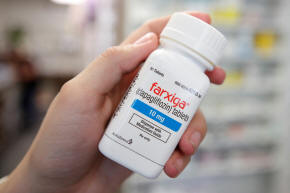U.S. Task Force to consider routine kidney disease screening as new
drugs available
 Send a link to a friend
Send a link to a friend
 [May 24, 2022]
By Deena Beasley [May 24, 2022]
By Deena Beasley
(Reuters) -An influential U.S. panel has
added screening for chronic kidney disease (CKD) to its list of
preventive services under active consideration, the group's chair told
Reuters, a move that could help identify patients eligible for new drugs
that treat the disease earlier.
The U.S. Preventive Services Task Force (USPSTF) last addressed the
issue in 2012, finding insufficient evidence to assess routine screening
for CKD in asymptomatic adults. That conclusion does not reflect the
latest science and is now inactive, Dr. Carol Mangione, chair of the
government-backed panel, said in an email.
The change has not been announced in any public forums, a USPSTF
spokesperson confirmed.
A potential update is being driven in part by new drugs that can slow
progression of a disease with no symptoms in its early stages but that
can lead to kidney failure, which is fatal without dialysis filtering or
a kidney transplant.
"For a screening to help people live longer, healthier lives, clinicians
must be able to treat the condition once it is found. The existence of
effective treatments is one of many important factors that the Task
Force considers,” Mangione said.
Newer type 2 diabetes treatments known as SGLT2 inhibitors that work by
prompting the kidneys to expel excess blood sugar through urine have
been shown to have separate beneficial effects on the heart and kidneys.

AstraZeneca's Farxiga won U.S. approval last year to slow progression of
early-stage kidney disease. A large trial of Eli Lilly and Boehringer
Ingelheim's Jardiance was stopped in March after it became clear the
drug was beneficial for kidney disease patients.
The National Kidney Foundation estimates that 37 million people in the
United States have kidney disease, but around 90% do not know they have
it. About 800,000 are living with end-stage renal disease, requiring
dialysis or a transplant to stay alive.
"Most of kidney and cardiovascular disease is silent ... until something
happens and then it is catastrophic," said Dr. Anjay Rastogi, director
of the University of California Los Angeles kidney health program.
USPSTF recommendations often trigger insurance coverage for testing.
Once the panel prioritizes an update of its screening recommendation, it
would create a draft plan and post it for public comment. The full
process could take as long as three years.
People with conditions such as hypertension and diabetes are at high
risk of kidney disease, and several medical societies already recommend
screening them for CKD. Diabetes is the leading cause of kidney failure,
accounting for about 40% of new cases, the Kidney Foundation estimates.
[to top of second column]
|

Diabetes drug Farxiga (dapagliflozin) is displayed at a pharmacy in
Provo, Utah, U.S. May 28, 2020. REUTERS/George Frey/File Photo
 OLDER DRUGS, 'DISMALLY LOW' USE
Until recently, treatment for those identified with early CKD
consisted largely of decades-old blood pressure medicines.
Because many cases go undetected, use of these
older drugs "is dismally low" at around 25% to 40% of CKD patients,
said Dr. Katherine Tuttle, a kidney disease expert at the University
of Washington in Seattle.
"The availability of more treatment options and relevant education
are critical," Eli Lilly said in an email.
Farxiga and Johnson & Johnson's Invokana were previously approved to
treat type 2 diabetes patients with CKD. A recent study using March
2021 data from a large Boston health center found that just 6% of
those patients had been prescribed an SGLT2 drug.
"Updating the screening recommendations for CKD would be a step in
the right direction toward combating this underdiagnosed disease,"
AstraZeneca said in an email.
Screening for kidney disease typically consists of a blood test for
levels of a waste product called creatinine and a urine test for
albumin, a type of protein.
"The tests we're talking about, like a urine albumin test, are $10,"
said Tuttle, adding that it is not this testing that "is breaking
the healthcare budget."
But the drugs themselves are costly, which has held back use.
Farxiga's U.S. list price is $533 for a 30-day supply, although
AstraZeneca emphasizes patient assistance programs aimed at covering
co-pays and the uninsured.
"Many of these patients, if intervention is not made, they will end
up on dialysis," said Sarah Walters, head of cardiovascular, renal
and metabolism for AstraZeneca.
(Reporting By Deena BeasleyEditing by Bill Berkrot)
[© 2022 Thomson Reuters. All rights
reserved.]
This material may not be published,
broadcast, rewritten or redistributed.
Thompson Reuters is solely responsible for this content.
 |